Living on a prayer: former ally ruins Pakistani government's weekend plans
A weekend frenzy of negotiations, dinners and committee meetings ends with a whimper

Aamir Abbasi
Editor, Islamabad
Aamir; a journalist with 15 years of experience, working in Newspaper, TV and Digital Media. Worked in Field, covered Big Legal Constitutional and Political Events in Pakistan since 2009 with Pakistan’s Top Media Organizations. Graduate of Quaid I Azam University Islamabad.

Javed Hussain
Correspondent
I have almost 20 years of experience in print, radio, and TV media. I started my career with "Daily Jang" after which I got the opportunity to work in FM 103, Radio Pakistan, News One, Ab Tak News, Dawn News TV, Dunya News, 92 News and regional channels Rohi TV, Apna Channel and Sach TV where I worked and gained experience in different areas of all three mediums. My journey from reporting to news anchor in these organisations was excellent. Now, I am working as a correspondent with Nukta in Islamabad, where I get the opportunity of in-depth journalism and storytelling while I am now covering parliamentary affairs, politics, and technology.
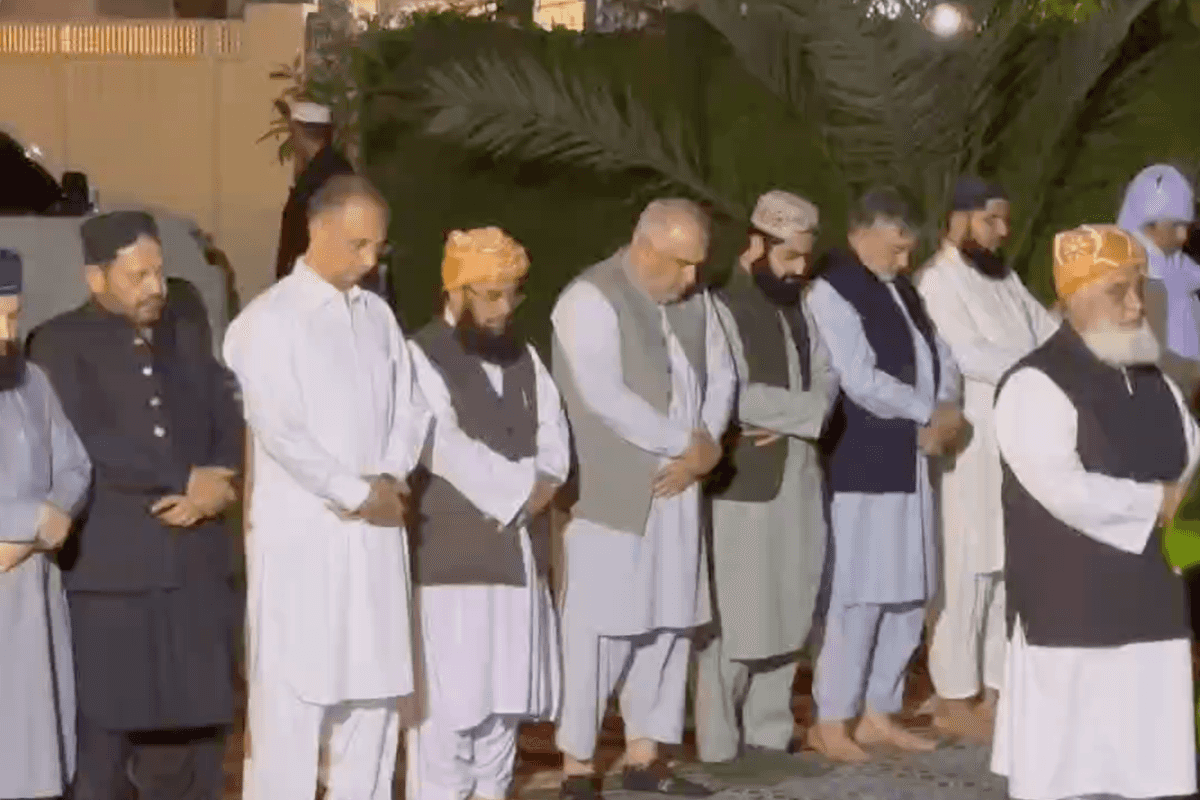
Screen grab of JUIF and PTI leaders praying together. Sept 15, 2024
JUIF media wing
The government’s ability to navigate parliamentary negotiations is likely to have a lasting impact on Pakistan’s judiciary and broader political future.
Leader of an opposition party Maulana Fazlur Rehman has been wooed aggressively by the ruling coalition and Imran Khan's PTI.
The long-awaited assembly session to present an important constitutional bill started at 11.06 PM on Sunday night, and was adjourned for Monday at 12.30 PM.
Defence minister Khwaja Asif was uncharacteristically curt while talking to reporters as he walked out of parliament once the brief session ended. "We just didn't have the numbers."
Over the weekend, the government tried to scrape together votes for a bill that is part of a broader package of judicial reforms that the government deems critical ahead of the retirement of incumbent chief justice. Chief Justice Qazi Faez Isa and the current government dispensation are considered to be on good terms and is set to retire in October.
Despite lengthy meetings with a key opposition party ally, the Jamiat Ulema-e-Islam Fazl (JUIF), the government was unable to present the long-awaited constitutional bill in parliament. For two days, the government scheduled cabinet meetings, parliamentary sessions and parliamentary meetings, only to be disappointed Sunday night
It was after opposition party Pakistan Tehreek-e-Insaf's leaders - including former speaker Asad Qaiser and parliamentary leader Omar Ayub - met with JUIF leaders, praying together for sunset prayers, that appeared to be the final nail in the coffin.
"The government hasn't shown us the draft of the bill," JUIF leader Maulana Ghafoor Hyderi told the media on Sunday night, dashing the ruling coalition's hopes.
Nukta's correspondents say Pakistan Muslim League Nawaz (PMLN) supremo Nawaz Sharif and Prime Minister Shahbaz Sharif had planned to meet with Maulana Fazlur Rehman, head of the JUIF, but cancelled plans at the last minute.
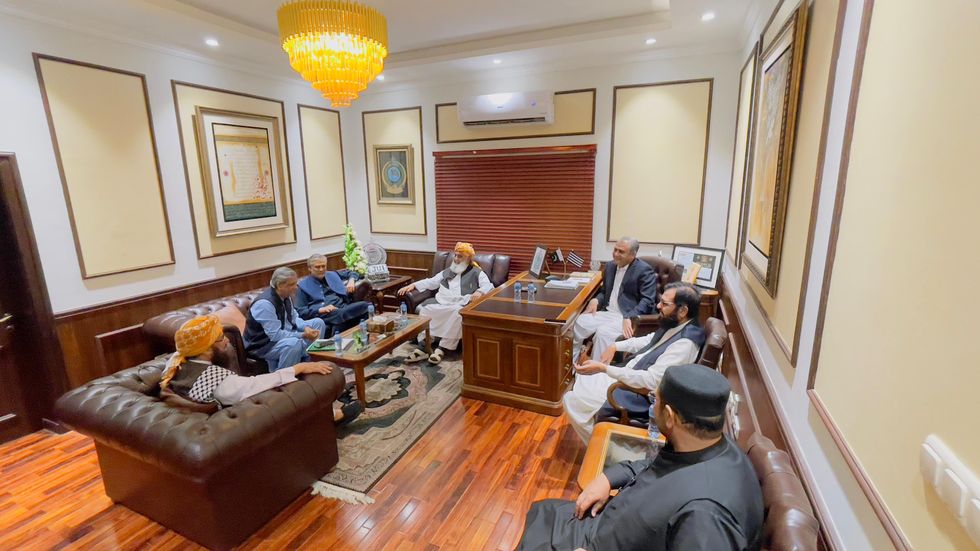
Nawaz Sharif in Islamabad for a day
Former prime minister Nawaz Sharif, landed in Islamabad on Sunday at Noor Khan airbase, where he was received by his brother, Prime Minister Shahbaz Sharif. He left without meeting Maulana Fazlur Rehman, however.
Since the PMLN's poor showing in the February 2024 elections, Nawaz Sharif has kept a distance from the affairs of the federal government. Despite winning a disputed seat from Lahore, the former prime minister did not attend the all-important budget sessions of the lower house of parliament in June.
Nawaz Sharif ended his political hiatus as the Pakistani government continues to face significant challenges in its efforts to pass the Constitutional Amendment Bill 2024, aimed at overhauling the country’s judicial system.
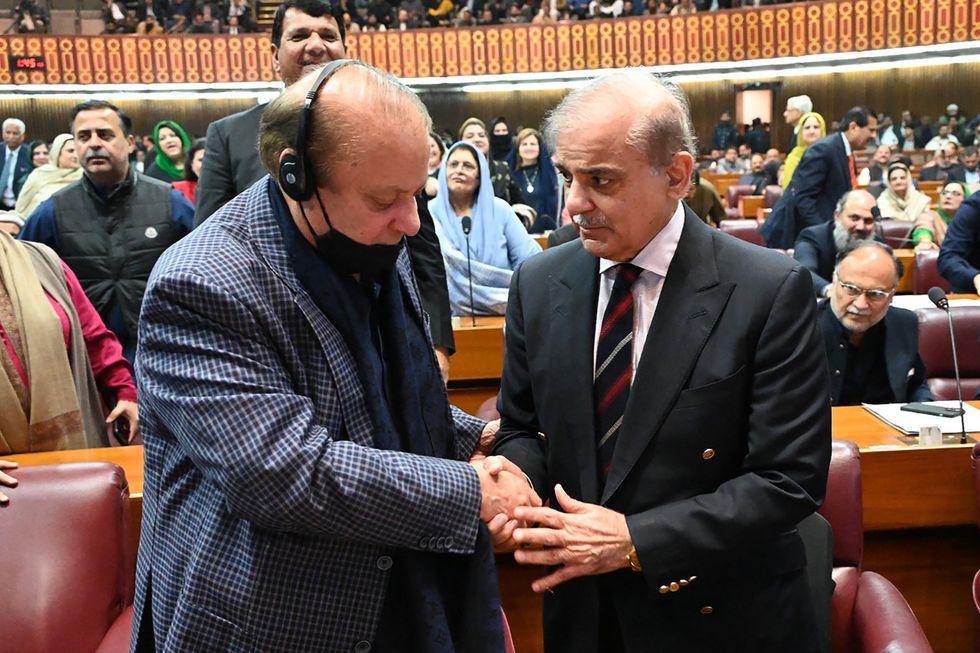
The bill is part of a broader package of judicial reforms that the government deems critical ahead of the retirement of incumbent chief justice. Chief Justice Qazi Faez Isa and the current government dispensation are considered to be on good terms and is set to retire in October.
What is the Constitutional Amendment Bill?
The Constitutional Amendment Bill 2024 includes several controversial provisions.
The proposed reforms aim to streamline judicial appointments, limit the powers of the Chief Justice, and address long-standing concerns about judicial independence and accountability.
However, these reforms require a two-thirds majority in Parliament, which the government does not currently possess without support from both its coalition partners and some opposition members.
From discussions with parliamentarians, Nukta has obtained the following details about the proposed bill:
1. A constitutional court will be established under the Charter of Democracy – signed in 2006 by former prime ministers Benazir Bhutto and Nawaz Sharif in London - which will take up cases related to articles 184, 186, 185 of the Constitution of Pakistan.
2. The government will appoint the chief justice for the proposed constitutional court.
3. The chief justice of the apex court will be chosen from a panel of five senior-most Supreme Court judges.
4. The judicial commission and parliamentary committee that will pick the chief justices of the supreme court and high court will be merged through a constitutional amendment.
5. Islamabad High Court judges can be sent to other provincial high courts on a rotation/transfer basis.
Wooing Maulana
At the center of political wheeling and dealing is Maulana Fazlur Rehman, head of the Jamiat Ulema-e-Islam-Fazl (JUI-F), a key opposition partner.
The government’s push for the judicial reforms package is dependent on the support of JUI-F and several other key members of the opposition. Without their backing, the bill cannot achieve the required two-thirds majority to pass in Parliament.
Rahman has rejected the government’s proposed extension of the Chief Justice’s tenure, instead calling for a comprehensive package of judicial reforms, a demand the government has been trying to accommodate.
His opposition has delayed the government's ability to introduce the bill and forced it into intense negotiations to secure his backing.
Meanwhile, the PTI has been actively opposing the government’s efforts, describing the proposed reforms as a direct attack on the independence of the judiciary.
PTI’s stance adds further complications to the government’s efforts to build consensus.
At Rahman’s request, the speaker of the National Assembly formed a special parliamentary committee to discuss and fine-tune the proposed reforms. This committee, headed by PPP’s Syed Khurshid Shah, has already met four times, although no final decision has been reached.
On Friday night, the Pakistan Tehreek-e-Insaf (PTI) party, led by Opposition Leader Omar Ayub, sent a delegation to meet with Maulana Fazlur Rahman at his residence. During this meeting, PTI expressed its opposition to the bill, labeling the government's efforts as an attack on the judiciary.
Shortly after the PTI delegation’s visit, a government delegation, including Deputy Prime Minister Ishaq Dar, Federal Minister for Law Senator Azam Nazeer Tarar, and Interior Minister Mohsin Naqvi, also met Rahman.
The government urged him to support the bill, but Rahman refrained from making any commitments, stating that he would consult with his party’s leadership before taking a final stance.
Recognizing the importance of Rahman’s support, Prime Minister Shehbaz Sharif took the unusual step of holding a one-on-one meeting with the JUI-F leader late on Friday night. During this meeting, Sharif reportedly invited Rahman to rejoin the government and requested his support for the constitutional amendment.
Sources suggest that Rahman remained non-committal, assuring the Prime Minister that he would give an answer after consulting with his party’s Majlis-e-Shura or consultative council.
Separately, Rahman was visited by PPP Chairman Bilawal Bhutto Zardari, who held a lengthy discussion with him before departing with a victory sign in front of the media, indicating some level of confidence in Rahman’s eventual support.
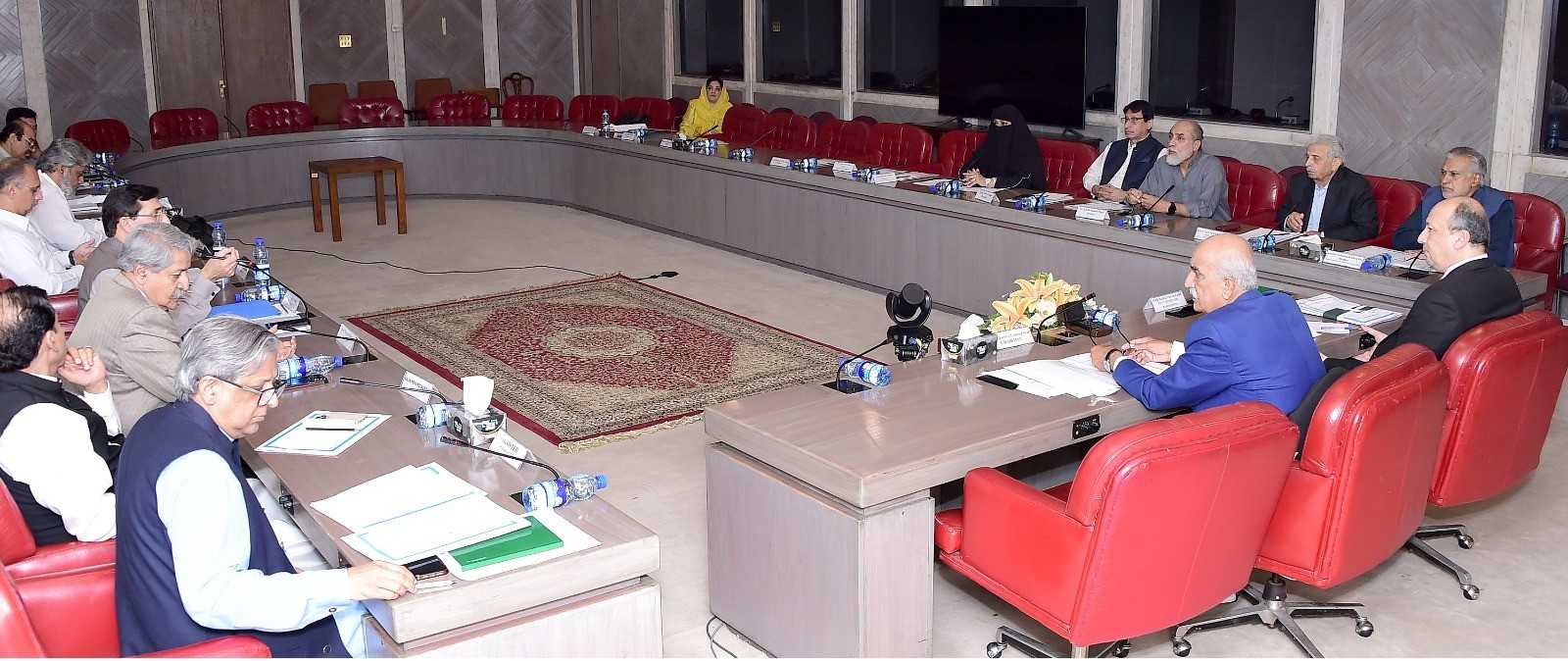
Chairperson Special Committee Syed Khursheed Ahmed Shah presiding over a meeting at parliament house. Sept 15, 2024
National Assembly media wing

Opposition leader Omar Ayub speaking with Chairperson Special Committee Syed Khursheed Ahmed Shah. Sept 15, 2024
National Assembly media wing
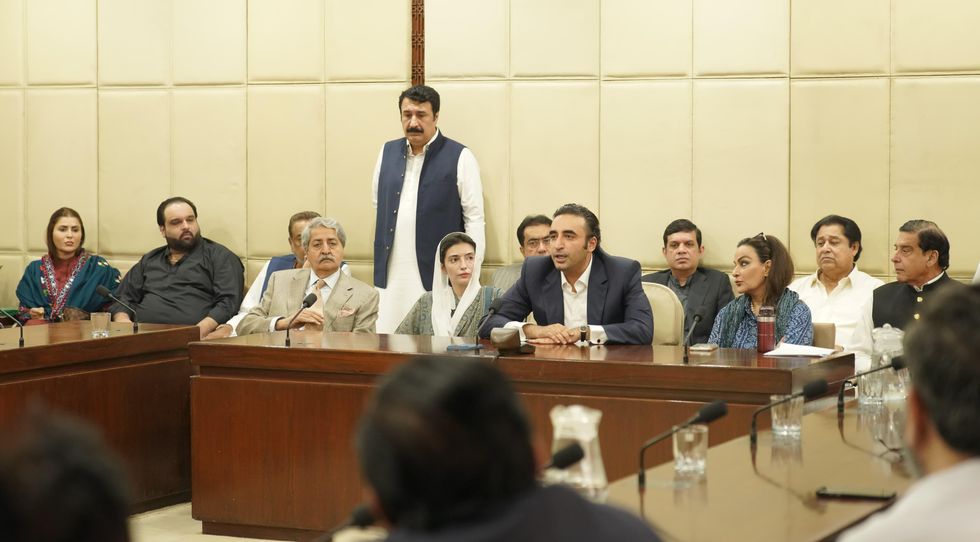
Chairperson PPP Bilawal Bhutto Zardari presiding over a meeting of his party's parliamentarians. Sept 15, 2024
Javed Hussain
Changing times
The timings for the federal cabinet meeting, special parliamentary committee and parliamentary sessions were changed several times during the course of the weekend.
The changes are believed to be to accommodate Maulana Fazlur Rahman’s ongoing consultation with his party, a critical step in determining whether JUI-F will ultimately support the government’s reforms.
If the special parliamentary committee achieves consensus, the government plans to present the Constitutional Amendment Bill 2024 in the National Assembly by suspending the usual rules, bypassing the committee review stage, and sending the bill directly to the Senate for final approval.
The stakes are high, as the proposed reforms include significant changes to the judiciary’s structure and processes. including changes to judicial appointments.
For Prime Minister Shehbaz Sharif, securing the passage of the bill is a top priority, as it would be a major political victory ahead of the next general elections, legally due in five years. The elections in February were marred by widespread accusations of rigging and manipulation.
Challenging the current dispensation is jailed opposition leader, Imran Khan, and his party, which had the highest vote share in the February elections. Khan and his party have faced numerous legal and political challenges; most recently when its top leadership was arrested from within the parliamentary premises.
The political landscape remains tense, with the government’s ability to navigate these negotiations likely to have a lasting impact on Pakistan’s judiciary and broader political future.







Comments
See what people are discussing